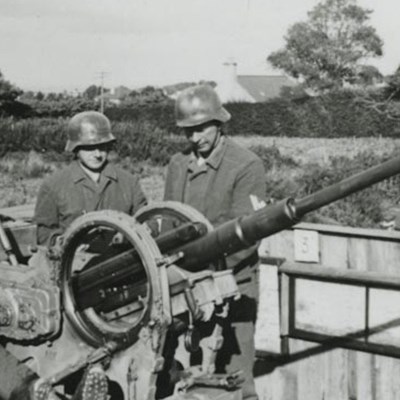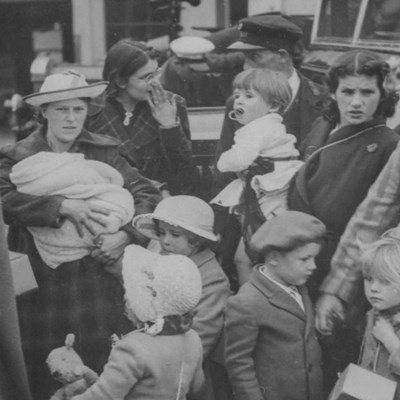In June 1940, German forces arrived in the Channel Islands, beginning what would become a five-year-occupation of our islands.
This year, the Islands of Guernsey mark the 80th year of Liberation from the German Occupation during World War II.
Reflecting on island life during the occupation, we celebrate two women who exhibited the utmost strength and courage during this time, striving for fair treatment and protection of their homes: Sibyl Hathaway, Dame of Sark, and Major Marie Ozanne.
Sibyl Hathaway, Dame of Sark
Born in 1884, Sibyl Hathaway ruled as Dame of Sark for 47 years, until her death in 1974. Her tenure spanned the reigns of four British monarchs, as well as World War II and the German occupation of the Channel Islands.
Cast out of her family home due to her father’s disapproval of her choice of husband, Sibyl lived in London until 1927. It was only upon the passing of the Seigneur, that she returned to Sark, a widow, inheriting her title as Dame of Sark and enforcing her feudal rights.
In the days before the Germans arrived in the Channel Islands, the British Government encouraged all islanders, where possible, to evacuate to the British mainland. Many across the islands followed these instructions, making their preparations to depart. Sibyl and her new husband Robert Hathaway, however, refused to evacuate. Assembling the residents of Sark, she informed them of their decision, expressing her belief that if the Germans arrived, they would not remain for long. Sibyl believed they would leave Sark once their supplies ran low. Her will and determination resonated with many local born islanders who elected to remain, although many English-born residents returned to the UK, including the only doctor.
Though the islands were demilitarised, the Germans, unaware of this fact, bombed Guernsey and Jersey on 28th June 1940, destroying many Sark fishing boats. Shortly after, German forces arrived, calling upon Sibyl at her home of La Seigneurie.
Reflecting on their arrival, Sibyl recounted: “I received the commander at my home. I told him firmly but politely that my people would not resist… But I pointed out that I had urged my people to stay on the island rather than evacuate to England, with the assurance that I would look after them”.
Being fluent in German, as well as French, Norman and Serequiais, and having worked in Cologne between the wars, Sibyl was able to communicate clearly with the occupying forces. A skilled negotiator, she secured favourable treatment for Sark islanders, commanding respect from the occupying force by controlling meetings and enforcing proper etiquette, including having them bow and kiss her hand before conducting any business.
Residents experienced a less hostile affront to their lives than other jurisdictions faced, co-existing in a state of mutual respect with the Germans. The resulting ‘soft’ occupation saw locals engage with the Germans much like they would any other guests to their home, playing sports, dining together and conversing civilly. They even celebrated holidays, including Christmas Eve and New Year's Eve, together. A further testament to her political efficacy, Sibyl also secured the arrival of a German doctor who would treat both locals and soldiers on the island.
However, this was still a life of occupation nonetheless, and locals were required to adhere to imposed curfews, blackouts, fishing rules and more. 1942 and 1943 also brought deportations to German camps, including non-Sark-born men, families and even Sibyl’s husband - the Seigneur, Robert Hathaway.
Locals were also obligated to fund the occupation. This was uniquely challenging in Sark due to their being no direct taxation on people or businesses. As supplies dwindled, this became even more difficult. With civilians being aided by Red Cross parcels towards the end of the war, German soldiers suffered most, fainting in the street from poor nutrition and searching for edible plant roots.
On the 10th May 1945, Sark was liberated from the occupation, with surrender papers signed by the German forces. Convening at La Seigneurie, Sibyl and the British forces planned the next steps for the island, whilst drinking champagne from bottles she had hidden underground in her garden for the last five years.
Authorised to give any orders deemed necessary, Sibyl tasked the Germans with repairing damages, reinstating phone lines to establish contact with the wider Bailiwick, and removing anti-glider posts and mines spread around the island, resulting in the deaths of two soldiers. Confiscated radios and horses were returned to residents, and a road was built along the Coupee, joining Big Sark and Little Sark.
Although many islanders were doubtful and even resentful towards Sibyl for her decision not to evacuate during the occupation, the devastation of Alderney silenced these criticisms, demonstrating just how fortunate they had been for Sibyl to ensure the protection of their home.
In 1965, Sibyl was made Dame Commander of the Order of the British Empire and is often referred to as a benevolent dictator. Today, she remains best known for the strength and command she exhibited during the five-year occupation, using her position and tactful manoeuvres to secure the best outcome she could for her island and its residents.
Marie Ozanne - Major in the Salvation Army
Born in Guernsey in 1906, Marie Ozanne, Major in the Salvation Army, was a champion of human rights and an occupation resister who publicly protested the treatment of prisoners of war as slave labourers by the German army during World War II.
Having completed her Salvation Army training in London, Marie served in France and Belgium working with disadvantaged women. Returning to Guernsey in 1940, she found herself living a life of occupation when the German forces arrived in the Channel Islands.
German orders mandated the immediate disbanding of The Salvation Army, outlawing the wearing of uniform, the practice of worship services and even performances by the army band. Marie, however, did not cower to the occupiers. Continuing her work, she regularly preached in St Peter Port, wearing her uniform and publicly condemning the German regime. German soldiers in Occupation documents referred to her as a “lunatic and religious fanatic”.
Eventually, her refusal to comply resulted in German officers forcibly taking Marie’s uniform from her. Undeterred, she continued to preach in the streets and began learning German in the hope that she could minister to any German soldiers who would listen.
In the summer of 1941, Marie wrote the first of many letters to the Feldkommandant, situated at Grange Lodge, reprimanding the closure of Salvation Army halls and symbols. Subsequent letters directly criticised the German treatment of Jewish people and Organisation Todt prisoners, who were brought to the island as slave labourers to develop infrastructure for Hitler’s Atlantic wall. Marie, witnessing the labourers being worked to death as they built bunkers and gun emplacements, began illegally bringing food and comfort to them, and warned the German forces that their rule would not last.
When orders were received from Hitler for 2,000, primarily British, residents who were not Guernsey-born to be deported to German camps, Marie asked to accompany them. She was denied. Twice she even volunteered to take the place of islanders who were to be executed for crimes against the occupiers, but was refused.
Whilst her incessant protests were largely ignored, eventually the German and Guernsey Police took her to the German Hospital on 3rd September 1942 for questioning before sending her home. On 5th September 1942, when she preached again, Marie was arrested. It was the intention of the German soldiers through this action to intimidate her into silence. Refusing to retract her complaints, she was moved from her cell to a room within a Guernsey policeman’s house just under a week later.
Despite the restriction on her freedom, Marie maintained her protests, writing further letters rebuking the deportations, ill-treatment on-island and German agenda.
Whilst there is no official record, it is highly suspected that Marie endured mistreatment during her imprisonment. She was released on 16th October, but recounted feeling “anxious now about life” in her journal.
Marie’s health took a downward turn following her release. Unable to walk and overcome with sickness, she collapsed on 2nd November and was taken for emergency surgery to treat appendicitis. Presumably unable to access antibiotics, her wound was painful and inflamed. It wasn’t long before she developed peritonitis and succumbed to septicaemia on 25th February 1943, aged 37.
In 1947, Marie was posthumously awarded the Order of the Founder, the Salvation Army’s highest honour.
A Guernsey Blue Plaque was unveiled at her former home in Vale on 23rd February 2013, the fourth to be unveiled in Guernsey. Marie was the first woman and non-artist to be recognised with the award.












